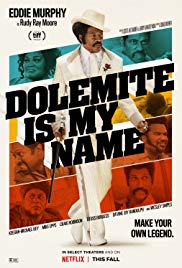
DOLEMITE IS MY NAME
US, 2019, 117 minutes, Colour.
Eddie Murphy, Keegan-Michael? Key, Mike Epps, Craig Robinson, Titus Burgess, Da' Vine Joy Randolph, Kodi Smit -Mc Phee, Snoop Dogg, Barry Shabaka Henley, Tip "TI" Harris, Chris Rock.
Directed by Craig Brewer.
Not everybody is on the wavelength of American stand-up comedy. Not always easy to get the jokes. Not always easy to know the references. And, this is especially true for non-American outsiders, black stand-up is not always easy to comprehend – and, there is always the problem of the language, rough and explicit.
There was a flourishing of African- American stand-up in the 1970s, think Richard Pryor. It was also a period of what is called “Blaxploitation� in American cinema, the tough private eyes, the tough crime situations, think Shaft or Cleopatra Jones.
This is setting the setting for this film, revealed for those of us not in the know as a true story. And, the film offers an opportunity for Eddie Murphy to get back to his stand-up comic style, his movie comedy style, which has been less forceful in more recent years. With this performance as Rudy May Moore, Dolomite, he is back on top.
And, who was Rudy Ray Moore? We see him at first working in the store, with some songs, trying to get them played on air. But, he is a man of self-confident (plus) initiative and, with some kind encouragement from a group of friends at a club where he has been a compere for other stand-up comedians, he interviews an old comedian and records all his jokes and routines, absorbing them, making them his own, performing at the club to great acclaim, recording the routines, becoming a best-selling performer.
Non-American? audiences, especially non-African- American audiences, may have to breathe in in listening to the routines, the language, the innuendo (and the explicit), and Rudy’s capacity for self-exploitation, the nude poses for promotion, the covers of his LPs, his travelling all over America and becoming a celebrity.
And, just as when he was on top, the idea comes that he should join the Blaxploitation trend and the latter part of this film is his attempts to exploit his character, Dolemite, with very little money, with very little knowledge and know-how, with enthusiastic support from his friends, hiring a self-centred actor as star and director (Wesley Snipes), getting a young white kid, Kodi Smit Mc Phee, and his friends as the technicians, the film finally gets, exasperatingly, completed.
Needless to say, it is terrible. However, in real life, Dolemite made several films (clips during the final credits) and, with the black audiences, it became something of a cult film, sometimes played for laughs, but eliciting laughs and applause from its audience.
Rudy Ray Moore had a capacity with words, rapping away in the 1970s into the 1980s, and considered by many the father of rap.
1. A true story? A memoir and tribute to Rudy Ray Moore?
2. The tradition of African- American stand-up comedy, memories of Richard Pryor and comedians from the 1970s, Eddie Murphy himself?
3. Los Angeles, the 1970s, Rudy working in the store, selling the records, spooking the records at the radio station, the appearance of Snoop Dog? Comparing the clubs, the owner and not enthusiastic? Travel around the United States? Making movies, the hotel is the site for the movie? The screenings?
4. The musical score, the songs of the 1970s, rap?
5. Eddie Murphy, his screen presence, embodying Rudy Ray Moore, as a person, as a performer, as an actor, as entrepreneur?
6. The title, Rudy Ray Moore and wanting routines, taping the comics routines and incorporating them into his own act, his decision to go into movies, the popularity of Blacks and at the time?
7. Rudy Ray Moore as a person, a salesman, failures with the radio, his talent, recording the routines, using them, becoming a compere, dressing as a pimp, the manager giving him a turn, his change, gelling with the audience, his jokes and routines, his tone and success?
8. Audience response to African- American humour, Frank, explicit sex, innuendo, language?
9. The decision to record his routines, selling them, the agents, the deals, the group at the club, their personalities, helping him? Posing for the nude covers? The sales, breaking records?
10. His tours, meeting lady read, the bond with her, her character, her support? In the club, in the movies?
11. The decision about the movies, the popularity of Shaft and Fred Williamson and others, his decision, back to New York, the issue of money, his lack of knowledge about filmmaking, the group and the lack of knowledge? His presumption? The impact of watching Jack Lemmon in The Front Page, the wide audience, the black audience not responding?
12. His going to the theatre, the meeting with Jerry Jones, their discussions, Jerry Jones agreeing to work on the screenplay, interactions with Rudy, they collaboration, his presence on the set?
13. His contact with D’ Urville Martin, flattering him, his agreeing to be the Dir and star, the growing exasperation, his attempts at directing, performance, giving up?
14. Hiring Nick, his age, lack of experience, film school, his assistance, the lack of film, equipment, lighting? Using the hotel, improvising? Scenes of rehearsal, scenes of performance?
15. Improvisation, Rudy and his appeal to the agents for money, his interest in karate, the sex scene, deciding that it should be funny, response?
16. Nobody wanting to distribute the film, the terrible reviews, the interview in Indiana, the presence of Chris Rock, his publicising the film, Rudy and his promotion?
17. The crowd is coming to see the film, the midnight show, seeing it funny, the film becoming a cult film? His further films and career?
18. Photos and sequences of the actual Rudy at the end? The film as an in memoriam?